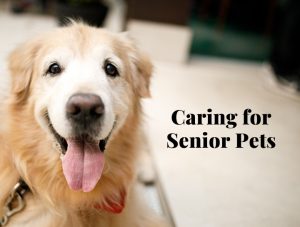Senior Pet Care: Ensuring a Happy and Healthy Aging Process
 As our beloved pets age, their needs change significantly. At Olsen Veterinary Clinic, we understand that senior pets require specialized care to ensure they continue to lead happy, healthy lives. In this article, we will discuss the unique needs of senior pets, including diet, exercise, and healthcare considerations.
As our beloved pets age, their needs change significantly. At Olsen Veterinary Clinic, we understand that senior pets require specialized care to ensure they continue to lead happy, healthy lives. In this article, we will discuss the unique needs of senior pets, including diet, exercise, and healthcare considerations.
Understanding the Aging Process
A pet is generally considered a senior when they reach around 7 years of age, though this can vary depending on the breed. Larger breeds tend to age more quickly than smaller breeds. As pets age, they may experience a variety of physical and behavioral changes, including decreased energy, changes in mobility, weight fluctuations, and increased susceptibility to health issues.
Diet: Nutritional Needs for Senior Pets
A balanced diet is crucial for maintaining the health of senior pets. Here are some dietary considerations to keep in mind:
- High-Quality Ingredients: Look for pet food that lists high-quality proteins and is rich in essential nutrients. Senior formulas often contain modified protein levels, antioxidants, and omega fatty acids to support aging joints and overall health.
- Caloric Needs: Older pets may have lower energy requirements. Adjusting portion sizes to prevent obesity is important, as excess weight can lead to joint problems and other health issues.
- Digestive Health: Aging pets may experience changes in digestion. Foods that are easier to digest, and those containing probiotics and fiber, can help maintain gastrointestinal health.
- Hydration: Ensure that your senior pet has access to fresh water at all times. Dehydration can be a serious concern, especially in pets with kidney issues.
Exercise: Keeping Active for Physical and Mental Health
Regular exercise is vital for senior pets to maintain their physical and mental health. Here are some tips to ensure your pet stays active:
- Tailored Exercise Routines: Adjust the intensity and duration of exercise based on your pet’s ability. Shorter, more frequent walks are often better than longer sessions. Swimming can be an excellent low-impact option for many dogs.
- Mental Stimulation: Engage your pet’s mind with puzzle toys, training sessions, or new experiences. This is especially important as cognitive function can decline with age.
- Watch for Signs of Discomfort: Be mindful of how your pet reacts to exercise. If they seem fatigued or show signs of pain, it may be time to modify their routine.
Health Care Considerations: Regular Check-ups and Preventative Care
Regular veterinary check-ups become even more critical as pets age. Here are key healthcare considerations:
- Routine Veterinary Visits: Schedule veterinary check-ups at least twice a year. These visits can help catch potential health issues early, including dental disease, arthritis, and organ dysfunction.
- Vaccinations and Preventative Medications: Stay up-to-date on vaccinations and parasite prevention. Senior pets may be more vulnerable to diseases, and preventative care is essential.
- Blood Work and Screenings: Regular blood tests can provide insight into your pet’s internal health. Early detection of conditions like kidney disease or diabetes can lead to more effective management.
- Dental Care: Dental health is often overlooked but is crucial for senior pets. Regular dental cleanings and at-home dental care can prevent painful dental diseases and associated health issues.
- Pain Management: Many senior pets experience chronic pain due to arthritis or other conditions. Consult with your veterinarian about pain management options, including medications, supplements, and alternative therapies like acupuncture.
Caring for a senior pet can be incredibly rewarding. By paying attention to their unique dietary, exercise, and healthcare needs, you can help ensure they remain happy and healthy throughout their golden years. At Olsen Veterinary Clinic, we’re here to support you and your senior pet with personalized care plans and compassionate guidance. If you have any questions or concerns about your pet’s health, please don’t hesitate to reach out to our team. Together, we can make the aging process a joyful experience for you and your furry companion.
